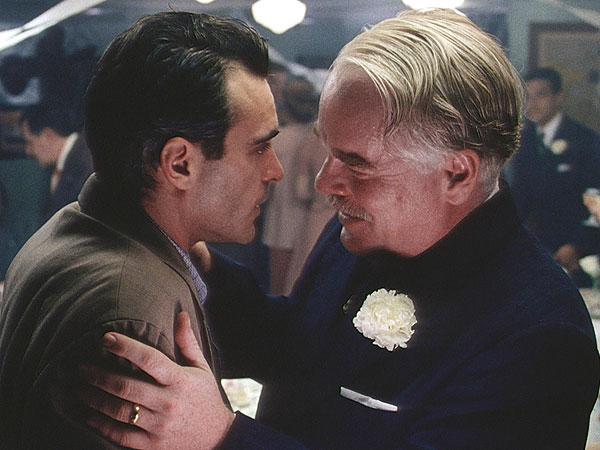 As a follow-up to the last post, which dealt with a novel about a "cult" (not my words), we went last night to see The Master, Paul Thomas Anderson's latest film. This is not a review of the film, but it was a slight vindication of a point I made in my previous post, that religion deserves to be treated with intelligent consideration. The "Master" of the title, a character called Lancaster Dodd, is substantially based on L. Ron Hubbard, the founder of Scientology -- arguably a far more damaging cult than that represented in The Revelations -- and yet, in an interview on Mark Kermode and Simon Mayo's show, Paul Thomas Anderson was quite adamant that the character, and the cult (named "The Cause"), do not have a wholly negative impact.
As a follow-up to the last post, which dealt with a novel about a "cult" (not my words), we went last night to see The Master, Paul Thomas Anderson's latest film. This is not a review of the film, but it was a slight vindication of a point I made in my previous post, that religion deserves to be treated with intelligent consideration. The "Master" of the title, a character called Lancaster Dodd, is substantially based on L. Ron Hubbard, the founder of Scientology -- arguably a far more damaging cult than that represented in The Revelations -- and yet, in an interview on Mark Kermode and Simon Mayo's show, Paul Thomas Anderson was quite adamant that the character, and the cult (named "The Cause"), do not have a wholly negative impact.It's also interesting to consider that Kermode and Mayo, who review films on 5Live on a Friday afternoon, also have a "cult" following: people who write to the show with their own reviews usually try to show off by referencing the in-jokes and personal foibles of the two presenters (which the podcast amplifies even further). Kermode, who has a PhD in film studies (he's a massive horror fan), is affectionately referred to as "the good doctor". And, in a serendipitous cycle of themes, it turns out that both Kermode and Mayo are regular churchgoers.
 |
| Joaquin Phoenix and Philip Seymour Hoffman in The Master |
This is not to dispute the fact that, if the John Sweeney Panorama programme is anything to go by, Scientology does sound like it's fucking crazy. And of course there are different degrees of "cult"-ishness, Kermode and Mayo being at the harmless end of the spectrum. But it is ignorant and unhelpful to ignore the numbers of people who become involved in these movements, without exploring why they might want to do so. The Master is a beautiful, superbly-acted movie (though "low on plot", as Anderson admits), which reserves judgment in an admirable show of reflectiveness and restraint.
One last thing. I am currently reading (Samuel-Johnson prize shortlisted) The Old Ways by Robert MacFarlane, about which I shall no doubt be posting soon. It is brilliant. It's about how rational and non-rational views of landscapes -- specifically ancient paths and roads -- might interact and complement each other, and MacFarlane is so wide-eyed and open-minded, as well as being a beautiful writer, that it is a joy to read.
No comments:
Post a Comment